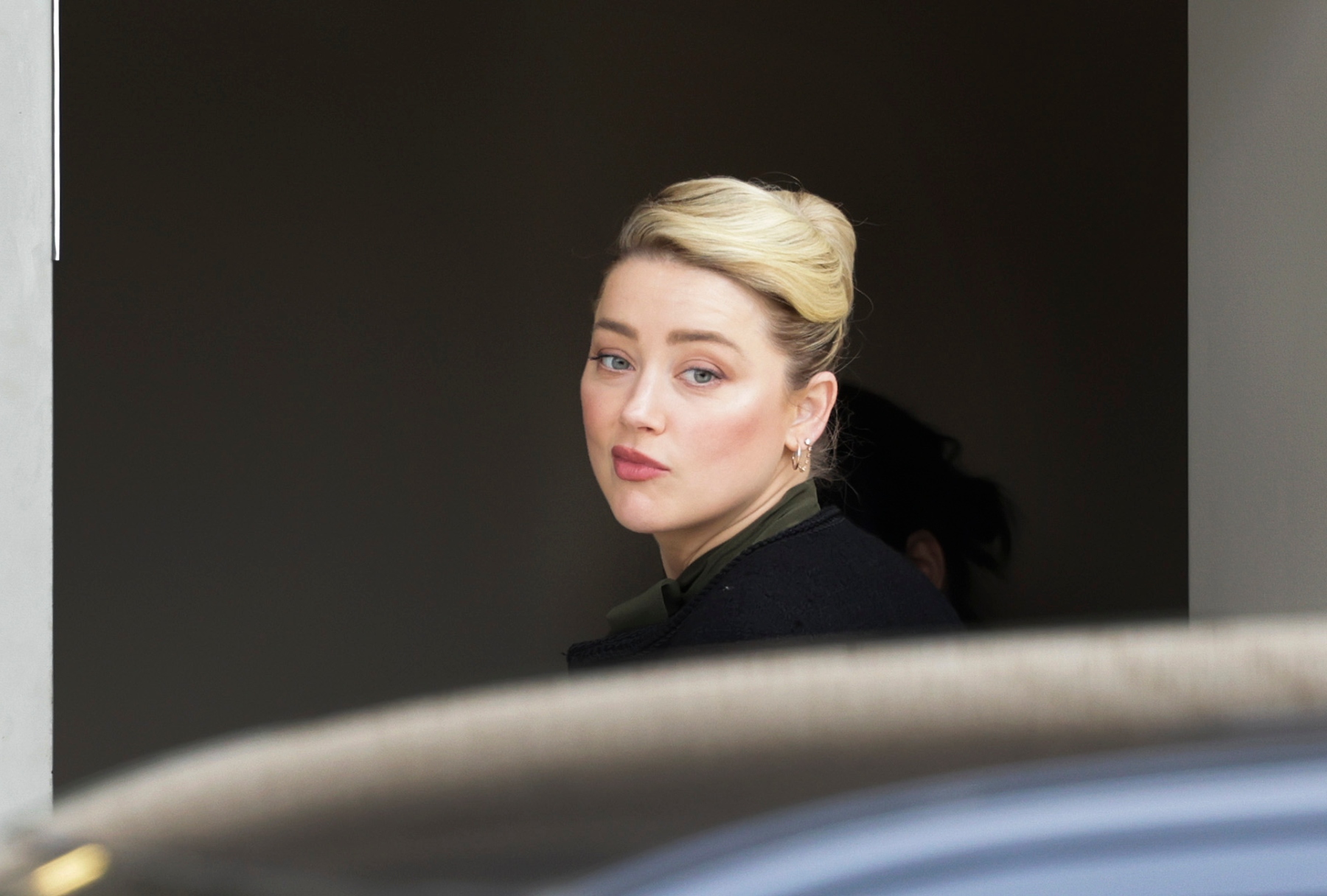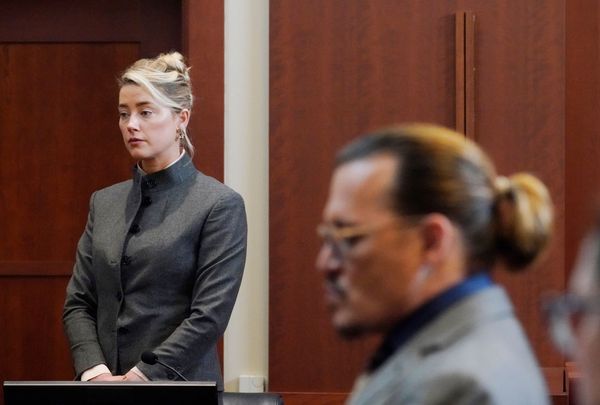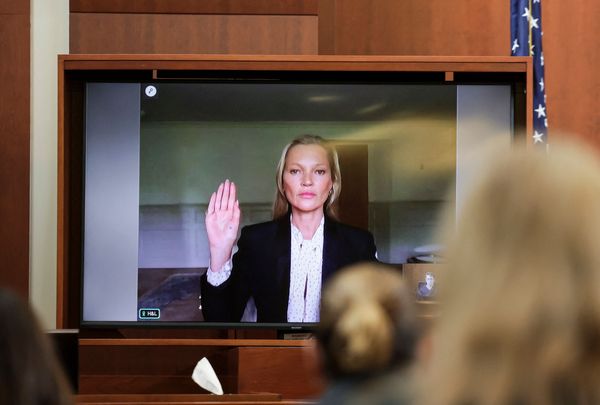
If the trial of Johnny Depp vs. Amber Heard had its own IMDb page – listing everyone involved in a TV or movie production – it would certainly be a star-studded one. Considering the way in which the trial has been treated by television coverage of the court process – as a juicy, highly sellable narrative affixed to a supposed pursuit of justice – it's a shock that it doesn't.
An increasingly popular genre of television, courtroom broadcasting seems to have seized its place in the broader media marketplace overnight with its wildly popular coverage of the Depp vs. Heard trial. Judging by its impact on the public and pop culture in the last couple months, the trial serves as a prime example of the way in which court-centric media needs to pathologize its subjects by design and maintains a fiduciary love of hating women. Court television has unabashedly cashed in on a survivor's trauma because it promises to yield high returns and large numbers of new subscribers. As an employee of one such station, I can attest to the fact that these networks have just as much to gain from this trial as Heard has to lose.
Court-centric media needs to pathologize its subjects by design and maintains a fiduciary love of hating women.
The very minute the trial aired, the network began cheering its newfound success. As a company that is relatively new on the media landscape, we had finally attained big viewership numbers to match those at major broadcast news outlets such as ABC, NBC and CNN. A flurry of emails went out between executives on how to leverage our sudden blowup in numbers into future production deals with other networks, distribution companies and streaming services, which then translated into these new projects going from unpitched ideas to the throes of the development stage seemingly overnight.
On a more tangible level, viewership numbers manifested as financial figures equally quickly. A slew of raises were distributed to the upper echelon of our productions for reaching new milestones, as were accolades from such platforms as YouTube, Spotify and SiriusXM for our high-performing content.
Official YouTube creator awards, known in the industry as "Play Buttons," now adorn our office walls to celebrate the high number of subscribers that Amber Heard's personal testimony brought in, as if her words were somehow our creative achievement. Likewise, the fact that our newly launched podcast overtook "Serial" on the Apple Podcast charts has been publicly lauded as "a testament to our incredible followers," with no mention of the trauma that informs the narrative we are simply repackaging.
From a business standpoint, this trial has been an excellent investment. If we want to feature criticism of Heard's failure to donate her prior $3.5 million settlement towards domestic violence causes, though, it only seems fair for us to also consider donating part of the sizable profit we've made in a few short weeks to similar organizations. Unfortunately, that is unlikely to happen, as the profit gained has already been wholly subsumed by executive bonuses, new equipment purchases and the launch of a brand-new podcast to exclusively cover the trial for those less interested in our unfiltered daytime television broadcast.
Over the span of this trial, the same combination of influence and celebrity appeal that once fueled the onset of the #MeToo movement has flipped its allegiances to now actively counter the provision of safe spaces for survivor testimony. Heard's op-ed was once a part of the #MeToo movement, whereas now it is figured as central to the movement's demolition.
As high-profile as the "Aquaman" star was before the trial opened, Heard is currently known by way of the mocking memes and clickbait takes that now flood every corner of the internet. They pick apart her overreactions, her underreactions and her choices of words. Outlets such as The Daily Wire have used her anguished face as a platform for ads discrediting her words and even makeup companies have tossed their opinions into the ring via TikTok smear videos.
RELATED: Lance Bass mocks Amber Heard's testimony in now-deleted post, jumping on a nasty TikTok trend
Even respected individuals in our network's newsroom – which likes to think of itself as one of journalistic integrity – were circulating the falsified account of Heard's opening statements amongst themselves. Several of them fully bought "The Talented Mr. Ripley" line-by-line comparison that has since been discredited as if they had not themselves reported on that day in court.
The only reason that Heard's demure side-part and puritanical blouses are so easily recognizable – and meme-able – is because our network filmed them and then made a point to re-air them again and again. Because the network had the foresight to know that her anguished face would make for a great foundation for internet jokes, we spoon-fed it to the public to do with whatever they wanted.

The only reason that Heard's demure side-part and puritanical blouses are so easily recognizable – and meme-able – is because our network filmed them and then made a point to re-air them again and again.
Court television, both as a genre of entertainment and as a rapidly growing business venture, understands this proliferation of mockery to be nothing more than a great opportunity to capture the ever-growing attention of tormentors eager to launch hate toward an imperfect woman. Its editorial approach and production strategies have matched this bloodthirsty attitude every step of the way.
If Amber Heard's crime was articulating in detail what she believes to be the narrative of her own body, court television's crime is taking that narrative and retooling it to fit an image of salaciousness more in line with a made-for-TV movie than a trauma unfolding in real life. None of this should come as a surprise, however, as this move is exactly what court television as a genre of entertainment was always designed to do – infuse traditional reporting with extreme yet scintillating exploitation that is tough to turn off and uncomfortable to think critically about.
In a subscriber-based news economy, the more spite-driven viewers who can be drawn in, the better for business.
Court television's whole premise is to invite viewers into the courtroom process not to respectfully observe or even to righteously whistleblow but rather to jeer, to poke fun at and to feel morally superior to those on the stand. It takes our right to engage with the American judicial system authentically and productively as invested onlookers and warps it into a parade of crime on display for misinformed judgment and misplaced aggression.
In a subscriber-based news economy, the more spite-driven viewers who can be drawn in, the better for business. Already, there have been discussions amongst executives at the network about how to keep our number up, since we've already become accustomed to the extra cash flow this recent boom has brought upon our office. The generally accepted solution is to keep selling Heard's story in different, but still relatable, genres – a reflective miniseries, a made-for-tv movie and even a reality show. The pipeline between real courtroom events and their soapy spinoffs is a direct one.
The case of Depp vs. Heard, in particular, has everything off of which court television thrives, plus a handful of bonus celebrity sightings. The video footage of Heard cuddling with James Franco in an elevator added an intriguing air of adultery to Heard's image, while "WandaVision" star Paul Bettany's texts to Depp referencing her "burned corpse" came off as more absurdist body horror than authentic dialogue. The goal of court television has always been entertainment, not realistic or investigative coverage.

During his first time on the stand, Depp characterized Heard as the "perfect partner" ... as though he is describing a fairy tale rather than an authentic account of an in fact very real relationship.
Meanwhile, the drugs and alcohol at the center of many of the fights between Depp and Heard during their marriage should make both of them unreliable narrators, yet in the public eye that characterization seems always to stick more to Heard than it does to Depp. Graphic pictures of Heard's bruises have been reduced to nothing more than a conversation about iPhone camera metadata, while Depp's fans stand outside the courthouse yelling "Justice for Johnny" and point to how kind he was in prior relationships 20 years ago.
During his first time on the stand, Depp characterized Heard as the "perfect partner" for the first few months of their marriage, before transforming into someone else entirely. In hearing him say as much, it's as though he is describing a fairy tale rather than an authentic account of an in fact very real relationship. In his testimony, he is leaning on the same formula so often used in fiction, where there must be a perfect good guy and a very imperfect villain. No partner is perfect, though. Still, court television's coverage of the trial has used the same playbook and clung to all the imperfections as they arose with the intensity of a sports match.
Sexual and physical trauma, already too often used as a storytelling device by both fictional and non-fictional media alike, has been distilled into its purest form in this trial through firsthand accounts, contradicting testimonies and scathing character witnesses. If the classic court procedural dramas (á la "Law & Order") tend to hinge their plotlines on the unveiling of trauma, court television does the same only with even less control over the presentation due to its live-streamed format.
Slices of Heard looking angry or upset are favorites, as are anything where either her graphic sexual abuse or the holes in her narrative are discussed.
Whatever control there is to be had by producers, editors, camera operators, etc., is wielded to amplify the faults of the defendant and pathologize their position rather than to approach them with compassion as real human beings forced to navigate a hellish experience. We have a several-seconds camera and audio lag time, meant to provide a quick buffer during which we can choose not to air certain graphic descriptions or images, yet rarely do we ever seem to utilize it.
Instead, it becomes fodder for B-roll or high-performing tweets. Slices of Heard looking angry or upset are favorites, as are anything where either her graphic sexual abuse or the holes in her narrative are discussed. Kate Moss' testimony that Heard was wrong to bring up rumors of violence circulating her and Depp's relationship in the '90s was played on repeat all afternoon and the following morning.

Sadly, this format fits all too well into a broader pattern of adjudicating the bodies of vulnerable individuals in our court system today. The fact that the takedown of Heard's survivor story happens to be playing out simultaneously to the imminent Supreme Court overthrow of Roe v. Wade adds an eerie realness to its outcome. If a beautiful, white, cis hollywood celebrity doesn't even have control over the way her body is discussed in court, what chance does any other women have of their bodies being treated with dignity in such a space?
Court television prides itself on spinning "justice" into watchable media. The depiction of justice should be at the forefront of producers' and editors' minds as they go about booking guests and writing anchor scripts. It is, after all, the No. 1 commodity that the network purports to sell.
Yet, it's still nothing more than a commodity when aired on TV. How can justice ever really be prioritized in a system that functions off of the currency of ratings and where the content needs to follow public opinion enough to capture its attention? Justice and entertainment rarely, if ever, coincide, seeing as the former is supposed to be truth-based and the latter necessitates significant editorializing.
RELATED: Why Fox News is obsessed with Johnny Depp, its Manliness Under Siege mascot
Justice and entertainment rarely, if ever, coincide, seeing as the former is supposed to be truth-based and the latter necessitates significant editorializing.
Moreover, the question of whether or not one can ever really ascertain justice when it comes to situations of trauma is an important one that gets intentionally ignored by those in charge of production and executive decisions within the court television industry. A conclusive truth is not easy to determine, as the reality of trauma relies on a number of factors including the survivor's upbringing, past history of relationships, ability to consent and positioning within various power structures. But good stories need satisfying endings.
Additionally, what kind of witnesses are really appropriate to call to the stand when attempting to adjudicate trauma? Typically, trial lawyers call who they see fit to carry out justice for their clients, however questionable they might be. The network, on the other hand, invites innumerable other unvetted voices to weigh in, purely as a means to build up sensationalism and continue the dialogue in such a way that will make for engaging TV. In the case of the trial of Depp vs. Heard, where witnesses include a slew of other celebrities and fellow media executives from TMZ and Warner Brothers, both lineups seem to have converged.
Morgan Tremainne, a former journalist from TMZ, testified in the past week about exclusive photos and video footage that had been obtained by the publication depicting Depp and Heard's explosive fighting at the height of their marriage turmoil. At the point when courtroom television leans on the investigative findings of tabloid culture to draw its conclusions, the distinction between trauma-peddling and justice-seeking has officially folded.
Want a daily wrap-up of all the news and commentary Salon has to offer? Subscribe to our morning newsletter, Crash Course.
A lot of my coworkers are waiting anxiously for the verdict, due by the end of next week. Really, though, the verdict doesn't matter. Depp has already won in the eyes of the media, which is an outcome pushed forth by courtroom coverage that was sympathetic to what he had to say because it made for high ratings. He was good at telling a story that the public was primed to believe, and court television couldn't have been happier to provide him a platform with which to do so.
More stories to read:







